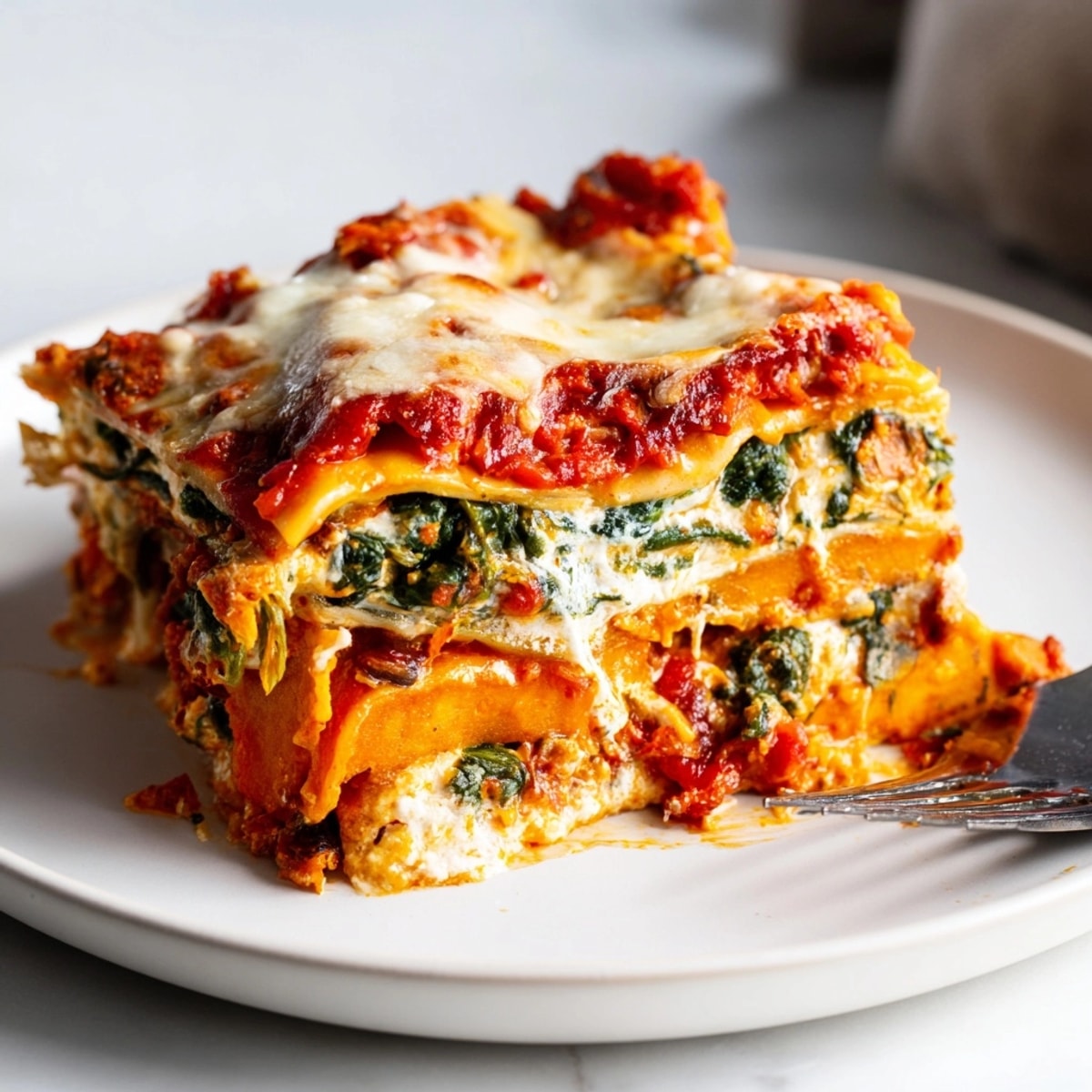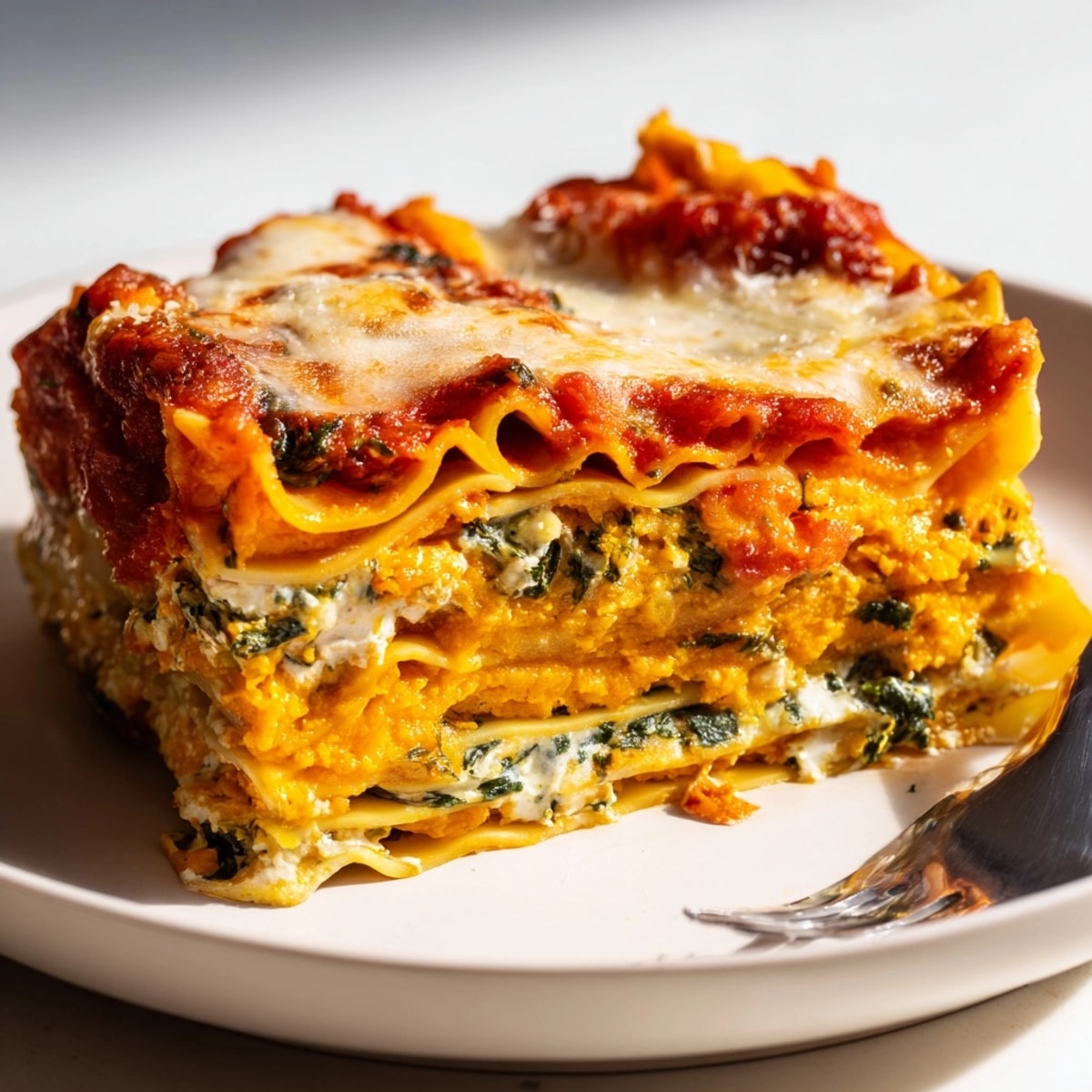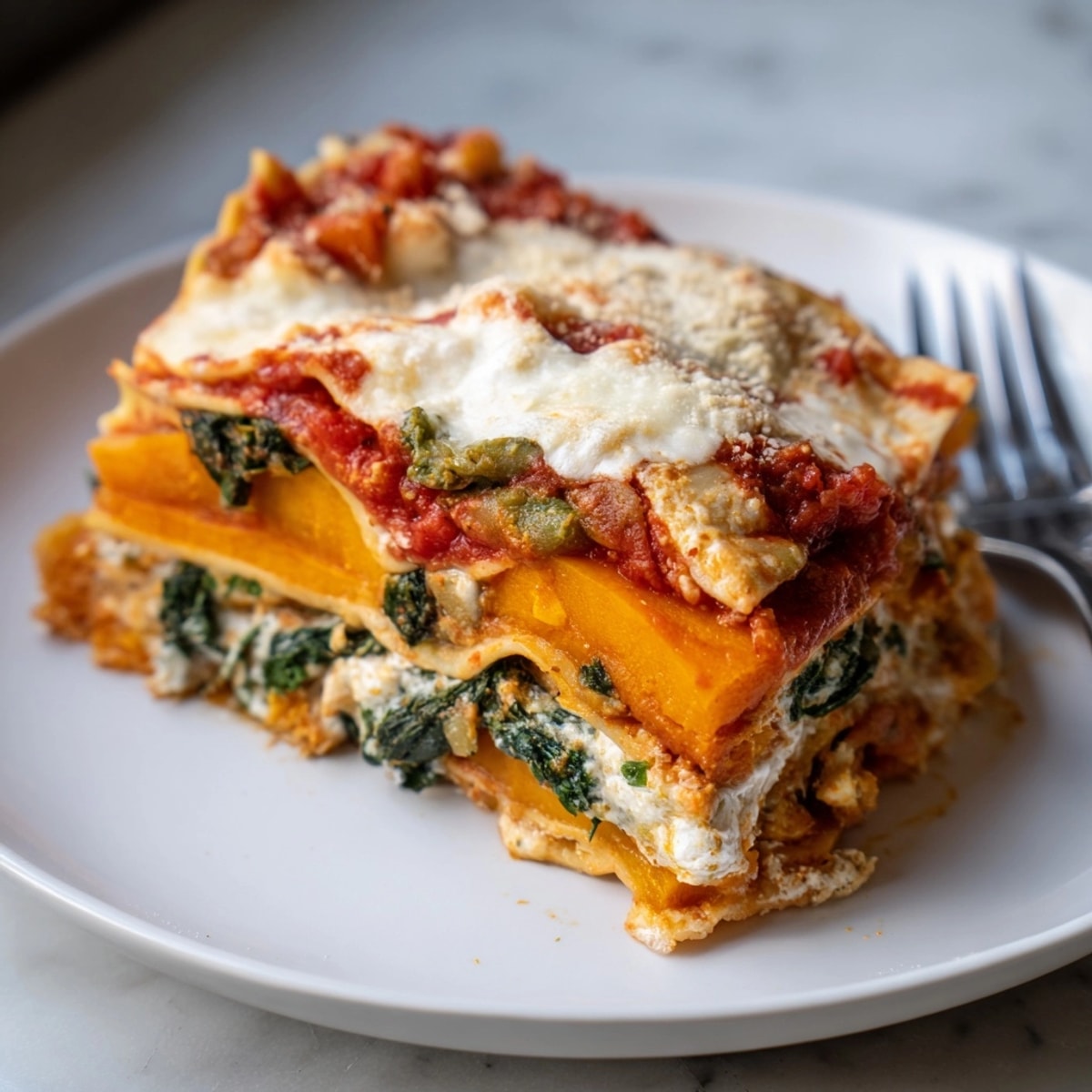
Layers of tender roasted butternut squash, creamy ricotta, and gluten-free pasta come together for a comforting Italian-inspired main dish. Rich tomato sauce and fresh spinach add depth, while mozzarella and Parmesan offer a golden, bubbly finish. Simple steps include roasting squash, sautéing vegetables, blending cheeses, and layering with gluten-free noodles, topped by a sun-drenched marinara. Serve with a crisp salad and your favorite dry white wine. Ideal for anyone seeking a gluten-free and vegetarian meal, this crowd-pleaser delivers flavor, comfort, and inclusivity at the table.
Gluten-Free Butternut Lasagna is pure comfort layered in every bite. Each forkful wraps roasted butternut, creamy ricotta, luscious spinach, and a tangy tomato sauce between gluten-free noodles for a feel-good Italian-inspired dinner that everyone at the table can enjoy. This is the recipe I go back to when I want something warming and inclusive especially for guests who eat gluten-free and vegetarian.
One chilly Sunday I made this for friends after a hike and not a crumb was left. The way the butternut caramelizes and melds with ricotta is simply irresistible.
Ingredients
- Butternut squash sliced into rounds: brings a nutty sweetness and structure to the layers. Look for firm squash with matte skin.
- Fresh spinach chopped roughly: adds a bright contrast and ups nutrition. Opt for deep green, perky leaves.
- Small onion finely chopped: builds aromatic base flavor. Choose onions with tight skins for freshness.
- Garlic minced: brings aromatic warmth. Select plump, firm cloves for best taste.
- Ricotta cheese creamy texture: is essential for rich layers. Stick to whole milk ricotta for flavor.
- Mozzarella cheese shredded: for gooey topping and in the filling. Always check labels for gluten-free certification.
- Parmesan cheese grated: is salty and nutty making the top golden. Block Parmesan grated at home is best for full flavor.
- Large egg: helps bind the filling and enriches texture. Choose free-range if possible for color and depth.
- Gluten-free no-boil lasagna noodles: make assembly easy. Use brands with solid texture and gluten-free labeling.
- Tomato passata or marinara sauce: delivers tang and ties flavors together. Go for jarred sauce with few additives.
- Olive oil: essential for roasting and sautéing. Seek extra virgin for fruitiness.
- Salt and freshly ground pepper to taste: brightens and balances all layers. Freshly ground pepper is best for kick.
- Dried oregano: boosts Mediterranean aroma and depth. Source organic or bulk for bold scent.
- Dried basil: lends sweetness and herbal notes. Check that herbs smell lively not dull.
Instructions
- Preheat the Oven:
- Set oven to four hundred degrees Fahrenheit or two hundred degrees Celsius. Line a baking sheet with parchment paper for easy cleanup. This step guarantees an evenly roasted butternut base.
- Roast Butternut Squash:
- Arrange squash rounds in a single layer on the prepared sheet. Drizzle with one tablespoon olive oil and sprinkle with salt and pepper. Roast for twenty minutes until fork tender and just starting to caramelize. Let cool. Caramelization here really ups the flavor.
- Prepare Spinach and Onion Mixture:
- Lower oven temperature to three seventy five degrees Fahrenheit or one ninety degrees Celsius. Meanwhile, heat remaining olive oil in a large skillet over medium. Add onion and sauté for three to four minutes until translucent but not browned. Add garlic followed by spinach and stir gently. Cook until spinach wilts completely and all moisture evaporates. Remove from heat to cool slightly.
- Mix Ricotta Filling:
- In a large mixing bowl combine ricotta cheese, egg, one cup mozzarella, and half the Parmesan. Stir in the sautéed spinach mixture until evenly distributed. Season with a pinch of salt and pepper. Ensure filling is creamy and cohesive.
- Season Tomato Sauce:
- Pour tomato passata or marinara into a separate bowl. Stir in dried oregano, dried basil, a pinch of salt, and cracked pepper. Tasting here ensures your sauce is full of flavor before layering.
- Layer the Lasagna:
- Spread a thin layer of tomato sauce over the bottom of a nine by thirteen inch baking dish. Arrange gluten-free lasagna noodles without overlap. Spoon ricotta spinach mixture on top followed by roasted butternut squash. Drizzle with more sauce. Repeat for two to three layers ending with noodles and generous sauce on top. Each layer should be even for uniform baking.
- Add Cheese and Bake:
- Scatter remaining mozzarella and Parmesan over the final layer. Cover the dish tightly with foil. Bake for thirty minutes to steam and meld the layers then remove foil and continue baking fifteen to twenty minutes until golden and bubbling. The uncovered step is when the top gets its signature crust.
- Rest and Serve:
- Let lasagna rest at room temperature for ten to fifteen minutes before slicing. This sets the layers and makes serving clean and appealing.

I adore the way butternut squash caramelizes in this recipe. Once when my niece came for dinner she ended up scraping the golden bits off the side of the dish and proclaimed it the best part. The colors and aromas in this lasagna always spark requests from my family.
Storage Tips
Store leftover lasagna tightly wrapped in the fridge for up to four days. Reheat individual portions in the oven or microwave for best results. For longer storage freeze sliced portions wrapped in foil and placed in an airtight container for up to two months. Thaw overnight in the fridge before reheating until hot.
Ingredient Substitutions
No fresh spinach on hand Use frozen spinach thawed and squeezed dry for similar texture. Ricotta can be replaced with cottage cheese blended until smooth if desired. Butternut squash could give way to roasted sweet potato slices or even thin sliced zucchini for a summery version.
Serving Suggestions
Pair this lasagna with a crisp green salad tossed in lemon vinaigrette. Serve with roasted vegetables or garlic bread if not gluten-free is needed for your group. A glass of dry white wine or sparkling water with a splash of citrus works perfectly.
Cultural and Historical Context
Lasagna originated in Italy as a humble layered pasta dish but has evolved into endless adaptations globally. Butternut squash is often featured in Northern Italian cooking especially in autumn for heartier vegetarian fare. This gluten-free twist pays homage both to tradition and inclusive modern dining.
Seasonal Adaptations
In autumn swap spinach for sautéed kale or chard. In spring add fresh herbs like sage or thyme to the filling. For a holiday table layer with cooked mushrooms for extra earthiness.

Every time I make this for a group mixed with vegetarians and gluten-free eaters I hear rave reviews about both the taste and texture. It is now requested as a birthday dinner by my best friend whose gluten intolerance used to keep lasagna off her list.
Recipe FAQs
- → How do I ensure the dish stays gluten-free?
-
Use certified gluten-free lasagna noodles and check all cheese and sauce labels for gluten-free certification to avoid cross-contamination.
- → Can I substitute kale for spinach?
-
Yes, kale works well in the filling and adds extra texture and nutrition. Chop it finely and sauté as you would with spinach.
- → What makes the layers creamy?
-
Creaminess comes from a blend of ricotta, mozzarella, egg, and Parmesan cheese. For even richer layers, add a gluten-free béchamel sauce.
- → Is pre-roasting the squash essential?
-
Roasting the squash enhances its flavor and creates tender slices, vital to achieving the best texture in each bite.
- → How do I avoid a watery finished dish?
-
Use no-boil noodles, properly roast squash, and ensure spinach has released its moisture during sautéing. Let the dish rest before slicing.
- → What can I serve alongside?
-
A crisp green salad and dry white wine pair beautifully with the hearty layers and fresh flavors on the plate.
